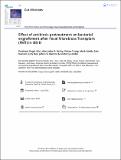Effect of antibiotic pretreatment on bacterial engraftment after Fecal Microbiota Transplant (FMT) in IBS-D
Author(s)
Singh, Prashant; Alm, Eric J; Kelley, John M; Cheng, Vivian; Smith, Mark; Kassam, Zain; Nee, Judy; Iturrino, Johanna; Lembo, Anthony; ... Show more Show less
DownloadPublished version (1.018Mb)
Publisher with Creative Commons License
Publisher with Creative Commons License
Creative Commons Attribution
Terms of use
Metadata
Show full item recordAbstract
Fecal microbiota transplantation (FMT) is an attractive strategy to correct microbial dysbiosis in diarrhea-predominant irritable bowel syndrome (IBS-D). Although the mechanism of FMT is thought to be bacterial engraftment, the best approach to achieve engraftment after FMT in IBS-D (and other diseases) is not clear. We evaluated the effect of FMT (with or without pretreatment with antibiotics) on gut microbiome and symptoms in patients with IBS-D. In this randomized, placebo-controlled, single-center study, 44 patients with IBS-D with a least moderate severity (IBS severity scoring system, i.e., IBS-SSS, ≥175) were randomly assigned to one of four groups: single-dose oral FMT alone, single-dose oral FMT following a 7-day pretreatment course of Ciprofloxacin and Metronidazole (CM-FMT) or Rifaximin (R-FMT), or Placebo FMT. Primary endpoint was engraftment post-FMT and secondary endpoints were changes in IBS-SSS, and IBS-quality of life (IBS-QOL) at week 10. Median engraftment was significantly different among the three FMT groups (P = .013). Engraftment post-FMT was significantly higher in the FMT alone arm (15.5%) compared to that in R-FMT group (5%, P = .04) and CM-FMT group (2.4%, P = .002). The mean change in IBS-SSS and IBS-QOL from baseline were not significantly different among the four groups or between the three FMT groups combined vs. placebo at week 10. In summary, antibiotic pretreatment significantly reduced bacterial engraftment after FMT in patients with IBS-D.
Date issued
2022Department
Massachusetts Institute of Technology. Department of Biological EngineeringJournal
Gut Microbes
Publisher
Informa UK Limited
Citation
Singh, Prashant, Alm, Eric J, Kelley, John M, Cheng, Vivian, Smith, Mark et al. 2022. "Effect of antibiotic pretreatment on bacterial engraftment after Fecal Microbiota Transplant (FMT) in IBS-D." Gut Microbes, 14 (1).
Version: Final published version